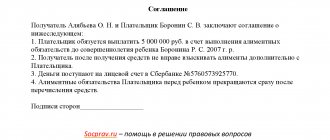The procedure for collecting utility bills
Let us immediately note that this procedure is not too complicated and has three stages: pre-trial, judicial and enforcement proceedings:
- The pre-trial procedure for collecting utility bills involves filing a claim against the defaulter. Such collection of utility bills cannot be called effective, since no more than 30% of debtors respond to it. A notice of disconnection from a utility service gives the greatest result in working with debtors (follow the link for more details on the procedure for disconnecting utilities for non-payment).
- Court. Mostly housing and communal services resort to judicial proceedings. Since it takes a long time to wait for payment during a peaceful settlement of the conflict, moreover, issues of quality of services provided by the service organization or recalculation constantly arise between the parties. As a rule, all controversial issues cannot be resolved without a trial.
- Execution of a court decision. Next, the court receives a writ of execution or a court order, submits an application to initiate enforcement proceedings at the bailiff service, and begins enforcement of collection of amounts collected from the debtor.
ATTENTION: do not miss the opportunity to consult a lawyer for free without a phone through commenting - by subscribing to our YouTube channel.
The procedure for collecting debt on utility bills for residential premises from individuals
The obligation to pay for living quarters and utilities is provided for in Art. 153 Housing Code of the Russian Federation.
The norms of paragraph 4 of Art. 154 of the Housing Code of the Russian Federation establishes that fees for utilities include fees for cold water, hot water, electricity, thermal energy, gas, domestic gas in cylinders, solid fuel in the presence of stove heating, fees for wastewater disposal, handling of solids municipal waste.
In addition, the owners of residential buildings bear the costs of their maintenance and repair, and also pay for utilities in accordance with agreements concluded, including in electronic form using the system, with persons carrying out the relevant types of activities (clause 3 of Article 154 Housing Complex of the Russian Federation).
In cases provided for in paragraph 5 of Art. 154 of the Housing Code of the Russian Federation, payment for utility resources consumed during the use and maintenance of common property in an apartment building is also included in the payment for utility services.
The procedure for providing utility services to owners and users of premises in apartment buildings and residential buildings is established by the Rules approved by Decree of the Government of the Russian Federation of May 6, 2011 N 354 (hereinafter referred to as the Rules).
In accordance with clause 4 of the Rules, the consumer can be provided with the following types of utility services: cold and hot water supply, sewerage, electricity supply, gas supply, heating, solid municipal waste management.
The provision of utility services to the consumer is carried out on the basis of a paid agreement containing provisions for the provision of utility services (clause 6 of the Rules).
The provision of utility services is provided by the management organization, partnership or cooperative, or the organization specified in paragraphs. “b” clause 10 of the Rules, through the conclusion of agreements with resource supplying organizations on the acquisition of utility resources for the purpose of using such resources in the provision of utility services to consumers (clause 13 of the Rules).
Payment for residential premises and utilities is paid monthly before the tenth day of the month following the end of the month, unless a different period is established by the management agreement of the apartment building or by a decision of the general meeting of members of the homeowners association, housing cooperative or other specialized consumer cooperative, on the basis of payment documents or information on the amount of payment for residential premises and utilities posted in the system or in other information systems that allow you to pay for residential premises and utilities (Article 155 of the Housing Code of the Russian Federation, clauses 66, 67 of the Rules).
Taking into account the deadline for payment of utility bills, provided for in Art. 155 of the Housing Code of the Russian Federation, debt for provided utility services arises from the 11th day of the month following the payment period.
In accordance with Part 14 of Art. 155 of the Housing Code of the Russian Federation, in case of failure to pay for utility services, a penalty is charged in the amount of 1/300 of the refinancing rate of the Central Bank of the Russian Federation for the entire amount of the debt.
Debt collection procedure
In accordance with paragraphs. “e(3)” clause 32 of the Rules, the contractor has the right to notify the consumer about the presence of arrears in payment of utility services or arrears in the payment of penalties (fines, penalties) by sending an SMS message via a mobile radiotelephone network to the consumer’s user equipment, a telephone call with a recording conversation, email message or through the consumer’s personal account in the state information system of housing and communal services, by posting on the official page of the contractor on the Internet or by transmitting voice information to the consumer over a fixed telephone network.
Meanwhile, for individuals, the pre-trial procedure for collecting debts on utility bills is not directly provided for by current legislation. However, as a rule, when a debt arises, the management company sends the debtor a notice of the need to repay the debt.
If there is no positive reaction from the debtor, the management company has the right to apply to the court with a corresponding application to collect debt on utility bills. The limitation period is 3 years (Article 196 of the Civil Code of the Russian Federation). According to paragraph 41 of the Resolution of the Plenum of the Supreme Court of the Russian Federation dated June 27, 2017 N 22 “On some issues of consideration by courts of disputes regarding payment for utilities and residential premises occupied by citizens in an apartment building under a social tenancy agreement or owned by them by right of ownership” to disputes related to with the payment by citizens of housing and utilities, a general three-year limitation period is applied, calculated from the day when the person learned or should have learned about the violation of his right and who is the proper defendant in the claim for the protection of this right (Art. Art. 196, 200 of the Civil Code of the Russian Federation). The limitation period for claims for collection of debt for payment of housing and utilities is calculated separately for each monthly payment (Part 1 of Article 155 of the RF Housing Code and Clause 2 of Article 200 of the Civil Code of the Russian Federation).
Based on the norms of Art. Art. 121, 122 of the Code of Civil Procedure of the Russian Federation consideration of a claim for collection of debt not exceeding 500 thousand rubles. payment for living quarters and utilities, as well as telephone services, is carried out within the framework of writ proceedings.
According to paragraphs. 1 clause 1 art. 23 of the Code of Civil Procedure of the Russian Federation, cases of issuing a court order are considered by a magistrate.
Disputes related to the payment by citizens of residential premises and utilities are considered by magistrates, as well as other courts of general jurisdiction in civil proceedings (Articles 22 and 23, Chapter 11, 12 and 21.1 of the Code of Civil Procedure of the Russian Federation) (clause 4 of the Resolution Plenum of the Supreme Court of the Russian Federation dated June 27, 2017 N 22 “On some issues of consideration by courts of disputes regarding payment for utilities and residential premises occupied by citizens in an apartment building under a social tenancy agreement or owned by them by right of ownership”).
According to para. 1 clause 5 of the Resolution of the Plenum of the Supreme Court of the Russian Federation dated June 27, 2017 N 22 “On some issues of consideration by the courts of disputes regarding the payment of utilities and residential premises occupied by citizens in an apartment building under a social tenancy agreement or owned by them by right of ownership” requirements for the collection of the amount debts for payment of residential premises and utilities not exceeding five hundred thousand rubles are subject to consideration in the order of writ proceedings (clause 1, part 1, article 23, part 1, article 121, paragraphs 10 and 11, article 122 of the Code of Civil Procedure of the Russian Federation) .
According to Part 2 of Art. 123 of the Code of Civil Procedure of the Russian Federation, an application for a court order is paid with a state duty in the amount established by the federal law on taxes and fees, which is 50% of the amount of the state duty established by paragraphs. 1 clause 1 art. 333.19 of the Tax Code of the Russian Federation (clause 2, clause 1, article 333.19 of the Tax Code of the Russian Federation).
The content of the application for the issuance of a court order and its form are established by Art. 124 Code of Civil Procedure of the Russian Federation.
A court order on the merits of the stated claim is issued within five days from the date of receipt of the application for the court order. A court order is issued without summoning the claimant and debtor and conducting a trial. The court examines the information presented in the claimant's application for a court order and the documents attached to it to substantiate the position of this person and issues a court order on the basis of the documents presented (Article 126 of the Code of Civil Procedure of the Russian Federation).
The judge, within five days from the date of issuance of the court order, sends a copy of the court order to the debtor, who has the right to submit objections to its execution within 10 days (Article 128 of the Code of Civil Procedure of the Russian Federation).
If the debtor does not submit objections to the court within the prescribed period, the judge issues to the collector a second copy of the court order, certified by the official seal of the court, for presentation for execution or sends it to the bailiff for execution (Article 130 of the Code of Civil Procedure of the Russian Federation).
If the debtor raises objections regarding the execution of the court order within the prescribed period, it is subject to cancellation (Article 129 of the Code of Civil Procedure of the Russian Federation).
If the amount of claims exceeds the established limit of 500 thousand rubles, or the court has issued a ruling to cancel the court order, the application of the management company is considered in the court of first instance through litigation in the manner provided for in subsection. Section II II Code of Civil Procedure of the Russian Federation at the defendant’s place of residence.
Attached to the application for an order or statement of claim: a receipt for payment of the state duty, an extract from the defendant’s personal account, bank details of the utility service provider, reports on services provided, documents confirming non-payment, calculation of debt and accrued fines, documents evidencing pre-trial settlement ( if available), other necessary documents.
Based on the results of the consideration of the case, the court makes a decision in accordance with Chapter. 16 Code of Civil Procedure of the Russian Federation.
The court decision comes into force after a month from the date of adoption of the court decision in final form (Articles 209, 321 of the Code of Civil Procedure of the Russian Federation).
Based on a court decision that has entered into legal force, the court issues a writ of execution to the plaintiff to collect the debt from the debtor or, at the request of the plaintiff, sends it to a bailiff for enforcement.
During the trial, as well as after the court decision, the debtor and the management company can agree to enter into a settlement agreement, which will include conditions beneficial to both parties. The settlement agreement is subject to mandatory approval by the court in which the case of collection of debt for utilities is being considered (Article 173 of the Code of Civil Procedure of the Russian Federation).
The procedure for forced collection of debt is provided for by Federal Law dated October 2, 2007 N 229-FZ “On Enforcement Proceedings” (hereinafter referred to as the Law on Enforcement Proceedings).
The following enforcement measures may be applied to individuals (clause 3 of Article 68 of the Law on Enforcement Proceedings):
foreclosure on the debtor's property, including cash and securities;
foreclosure on periodic payments received by the debtor due to labor, civil or social legal relations;
foreclosure on the property rights of the debtor, including the right to receive payments for enforcement proceedings in which he acts as a claimant, the right to receive payments for hire, rent, as well as exclusive rights to the results of intellectual activity and means of individualization, rights of claim under agreements on the alienation or use of the exclusive right to a result of intellectual activity and a means of individualization, the right to use the result of intellectual activity or a means of individualization belonging to the debtor as a licensee;
other measures provided for in Art. 68 of the Law on Enforcement Proceedings.
| print version | Version for MS Word | Consumer rights Protection |
How is the statute of limitations for utility bills calculated?
The initial stage of the process after a claim is the issuance of a court order. In this case, one should also take into account such a term as the statute of limitations, according to which debts are collected for services already provided exclusively without fail within a certain time period.
Please note that the time frame for collecting utility bills is provided as a general one (it is set for 3 years for claims from the moment the debt was incurred for the current month).
The debt is collected for payments within an indefinite payment period, a uniform period of 3 years is applied. During this period, a person has the right to pay off the debt, distributing it at his discretion over the entire period, but at the same time he risks receiving penalties for using the money.
Claim for collection of utility bills or court order
Collection of utility payments by court order or through litigation in the event of an obvious dispute is beneficial for both the debtor and housing and communal services. The court for the collection of debts on utility bills makes it possible for utility companies to obtain a writ of execution and begin proceedings to force the debt to be closed, and helps citizens understand the correctness of the accrual.
Why is a court order for utilities more profitable?
If the debtor has not responded to the pre-trial claim, we begin to go to court. In any case, if there is no particular dispute regarding charges, it is advantageous to start with an application to the magistrate for the issuance of a court order for the amount of utility debt.
IMPORTANT: during writ proceedings, the management company saves on state fees by receiving a 50% discount on it, and there is also a reduced period of time spent on judicial consideration of the application.
When is a claim for collection of utility bills required?
If the debtor has sent an objection to the court order to the magistrate or there is a clear dispute over charges, then the housing and communal services service files a claim for collection of utility payments. After which, meetings will be scheduled, for which the utility service must have strong evidence and present it in the form of:
- debt period;
- amounts;
- the entire period of late payments;
- the amount of penalties accrued for late payments;
- the amount of expenses for initiating legal proceedings.
If the service wins, the debtor is obliged to pay the court collection of utility payments in the form of the principal debt for services, accrued penalties and all legal costs.
A court order for the collection of utility bills from registered persons automatically comes into force if the debtor refuses to receive it or does not send an objection to the judge. In this case, housing and communal services have the opportunity to submit an order to the bailiff service.
IMPORTANT: watch the video on the topic of recalculation of utility bills, disputes with management companies: advice from a lawyer on housing issues
Features and legal characteristics
Legal relations in the field of housing and communal services are regulated by the general norms of civil legislation.
For disputes the subject of which is the collection of debt for housing and communal services, the statute of limitations for utility services is set at three years. This position is confirmed by paragraph 41 of the resolution of the plenum of the Supreme Court of the Russian Federation dated June 27, 2017 No. 22. The debt is also collected outside the established period of time. If the management organization applies for debt collection after three years, the defendant has the right to file a petition to apply the statute of limitations. In the absence of such a statement, the court will continue to consider the case, which is confirmed by paragraph 2 of Art. 199 of the Civil Code of the Russian Federation. At the moment, the rules of law by which the statute of limitations for housing and communal services debts are calculated have not changed; 2021 did not bring innovations. The petition is submitted orally or in writing, for example, at the stage of the preliminary court hearing. ConsultantPlus experts told us what to do with communal services if you are leaving for a long time. Use these instructions for free.
Calculation of debt for collecting utilities
Debt occurs when a person is 30 calendar days late. From the 31st day the calculation of the debt for collecting utility bills begins. A penalty of 1/300 of the refinancing rate is charged on the amount of debt for all days of delay. Moreover, if the debtor ignores this fact within 3 months, more stringent measures are applied.
If a claim for payment of utility bills needs to be drawn up professionally, then the management company can contact us for help. If, on the contrary, a citizen requires protection, then an objection to a court order for the collection of debts on utility bills or a counterclaim for recalculation will maximally defend the interests of the debtor.









